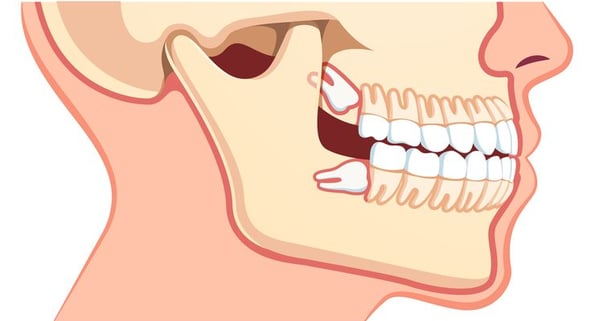Tooth Impaction - The Wisdom that Doesn't Grow Perfectly
Do you know what tooth impaction is? Tooth impaction is a condition where the tooth that is supposed to grow cannot come to the surface of the gum perfectly, either partially or completely so that it is embedded in the gum. This condition often occurs in wisdom teeth, which are the last teeth to erupt when we are between 17-25 years old. Learn more about wisdom teeth impaction in this article.
BODY HEALTHWISDOM TEETHIMPACTED TEETHIMPACTED WISDOM TEETHDENTAL HEALTH TIPS
11/19/20243 min read


Wisdom tooth impaction is a condition where the last molars do not get a place to grow perfectly. This condition can occur without causing pain, so sometimes when we just realize this condition, the closest teeth from the impaction condition can become victims. Because tooth impaction can make the teeth that are nearby pushed so that it causes a hole or makes its position change, if you don't get immediate treatment for the condition, it is likely that not only the tooth that has suffered an impaction that must be removed but the next tooth as well because it can be ascertained that the tooth has suffered damage (cavities due to the push of the tooth that grows impractically). In addition, this condition can also lead to plaque buildup in the gums, risking inflammation and swelling of the gums.
What Causes Tooth Impaction?
Before discussing the causes, let's first know that baby teeth will start to grow when we become babies aged 4-6 months, then will fulfill the growth when we become children aged 2-3 years. Then when we become 6 years old, the baby teeth will begin to be replaced with permanent teeth.
Normally, adults have 32 teeth, including 4 wisdom teeth that erupt last when we are between the ages of 17-25. And tooth impaction occurs when one or more of the permanent teeth do not get enough space to grow in completely. Various conditions that can cause tooth impaction include:
Having a small or narrow jaw that does not have enough space for the teeth to grow completely
Late loss of baby teeth that prevent permanent teeth from erupting 2.
The presence of tumors or cysts in the jaw that block the growth of teeth.
Symptoms of Tooth Impaction
As explained earlier, tooth impaction can be partial or total. In general, total tooth impaction does not cause any symptoms, but its impact can be worse than partial tooth impaction which usually causes discomfort, because total tooth impaction can push the nearby teeth so that the arrangement of teeth will change.
In partial tooth impaction, what can aggravate the condition is the presence of food debris and plaque that enters the gap of the impacted tooth so that many bacteria and germs often develop faster and cause various symptoms, Some symptoms are:
Bad taste in the mouth and bad breath (Halitosis)
Gum pain due to swelling in the gum area of the impacted tooth (pericoronitis)
Prolonged headache
Difficulty opening the mouth as the jaw becomes tense making it difficult to open or sounds when opened
building a gap between the impacted tooth and nearby teeth
Swollen lymph nodes in the neck.
When to see a doctor
Go to the doctor immediately if you have incomplete teeth, especially if the condition is accompanied by pain in the gums or other symptoms.
It is also necessary to see a dentist immediately if you experience frequent pain from the jaw that radiates to the face, head, ears, and neck, even if the results of a nerve examination are normal.
Treatment of Tooth Impaction
In general, if the condition of tooth impaction does not cause symptoms or discomfort in the mouth, the doctor will ask the patient to undergo regular control. However, if tooth impaction causes symptoms, the doctor will take the following actions:
Tooth extraction
A tooth extraction procedure can be performed if the tooth is partially impacted and has symptoms such as pain or bad breath.
Tooth extraction surgery
Tooth extraction procedure is performed if the tooth impaction occurs completely (the tooth is buried under the gum and cannot emerge). In this procedure, the doctor will make an incision in the gum and remove the impacted tooth. The doctor will then stitch the incision back together and cover it with gauze.
After administering the above measures, the doctor will prescribe painkillers such as mefenamic acid and antibiotics to prevent infection.
Complications of Tooth Impaction
If tooth impaction does not get proper treatment, it will cause several conditions that are more severe than the impaction itself. Some of them are:
Abscess on the impacted tooth
Long-term discomfort and discomfort in the mouth, especially when eating
Infection and teeth misalignment (Malocclusion).
Plaque build-up on teeth and gums.
Conditions that may damage other teeth near the impacted tooth (cavities from being pushed in)
Nerve damage if tooth impaction occurs near the jaw nerve (Mandibular Nerve).
Prevention of Tooth Impaction
There is no specific way to prevent tooth impaction. This is because tooth impaction is often caused by genetic factors (narrow/small jaw). However, if you have an impacted tooth, there are several things you can do to prevent complications, namely:
Keep your teeth and mouth clean by brushing twice a day.
Have your teeth checked by a doctor at least once every 6 months.
Diligently rinse your mouth.
See a doctor immediately if symptoms of tooth impaction appear.
Overview of impacted wisdom teeth
